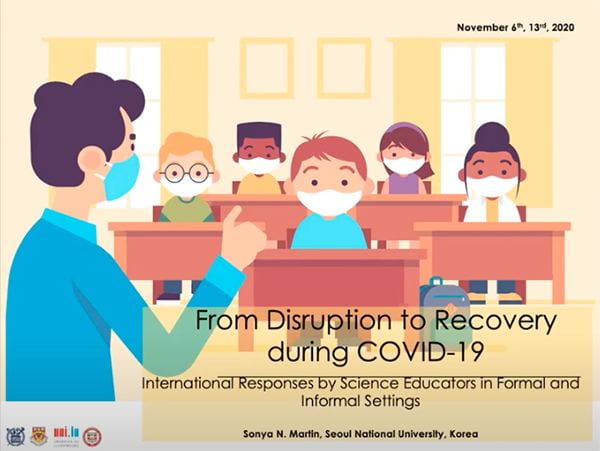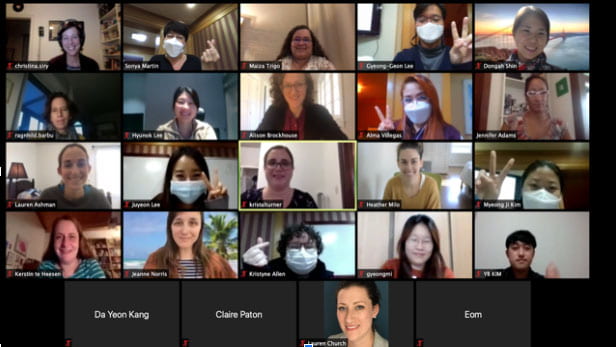
For 30 years, Washington University’s Institute for School Partnership has spearheaded efforts to provide high-quality STEM learning and teaching in the St. Louis region. As the COVID-19 pandemic unfolded across the globe, disrupting schools, the ISP worked quickly to adapt, design, and implement resources to support the continuation of teaching and learning locally.
This past fall, ISP team members took to an international stage to share their expertise in meeting the education challenges posed by the outbreak. This work has focused heavily on problem-solving with schools, designing and improving resources for online learning that provide engaging hands-on experiences to every student. To this end, the ISP fast-tracked efforts to bring virtual learning programs to St. Louis and beyond.
In November 2020, at an international symposium hosted by Seoul National University in South Korea, members of the ISP had an opportunity to present their experiences supporting teachers and students during the previous nine months.
The virtual symposium, “From Disruption to Recovery During COVID-19: International Responses by Science Educators in Formal and Informal Settings,” brought researchers and education leaders together to share their experiences and findings. It provided participants the opportunity to collectively frame research questions for future collaborative learning on how to re-envision what science teaching and learning can and should look like in the post-COVID-19 era.
“Dr. Sonya Martin [of Seoul National University] heard about the great work we were doing and invited us to participate because she thought we had a lot to contribute to the conversation. She wanted to have a wide range of science educators and researchers from across the globe involved in learning from one another and finding opportunities to collaborate in the future,” explained Rachel Ruggirello, ISP associate director. “We shared how the ISP, and in particular our mySci science program, responded to support teachers.”
At the forefront of the ISP response was creating strategies and resources to support continuity of learning for teachers and students. That support included pivoting professional development online, building kits of materials for teachers to take home, adapting the mySci curriculum for virtual learning, creating student-facing lab videos, and producing math and science programming to be broadcast on Nine Network’s “Teaching in Room 9.” ISP instructional specialist Heather Milo spotlighted her experience creating a COVID specific curriculum with a science teacher at the Hawthorn Leadership School for Girls, that supported not only a continued focus on helping students construct scientific explanations related to a real-world phenomenon, but also provided a valuable resource to regional teachers for teaching about COVID-19. ISP team members highlighted how they used improvement science tools and principles in new ways to focus and prioritize work.

Researchers from the U.S., Canada, Luxembourg, Germany, South Korea, Mexico, and Portugal joined virtually to discuss differing responses to the crisis and paths forward for educators.
“They were impressed with the things we had done,” Ruggirello said. “They were particularly interested in our ability to quickly pivot to support teachers. Our team was able to provide practice-based evidence for identifying and developing responses to disruptions in formal and informal education.”
ISP Executive Director Victoria L. May credits her organization’s rapid response to its longstanding and trusted relationships with employers, foundations, and individuals in the community.
“In the absence of an organized national or statewide effort, the ISP was able to leverage relationships to create a coordinated strategic approach to support teachers,” May said. “Because of our connections and role as a hub of the region’s STEM efforts, we were ideally positioned to maximize impact.”
The ISP provides technical assistance, professional development, and curriculum to over 300 schools in 52 districts across the St. Louis region.
ISP evaluation director Maia Elkana described the process and results of the ISP’s ongoing response to the COVID-19 pandemic.
“Our team gathered stories and data from hundreds of teachers from across the state and metro area to add to what we know from decades of partnering with schools within a few weeks. Now, that data-driven approach is paying off and we are sharing what we’ve learned.”
ISP members who participated in the symposium included Rachel Ruggirello, Lauren Ashman, Jeanne Norris, Maia Elkana, Heather Milo, Alison Brockhouse, and Tori Engel.
The ISP has been invited to share their knowledge with a wider community at the 2021 International Conference of KASE (Korean Association for Science Education), happening in late January.
Click here to view video presentations from Day 1 of the symposium.
Click here to view presentations from Day 2 of the symposium.
Media Contact: Myra Lopez